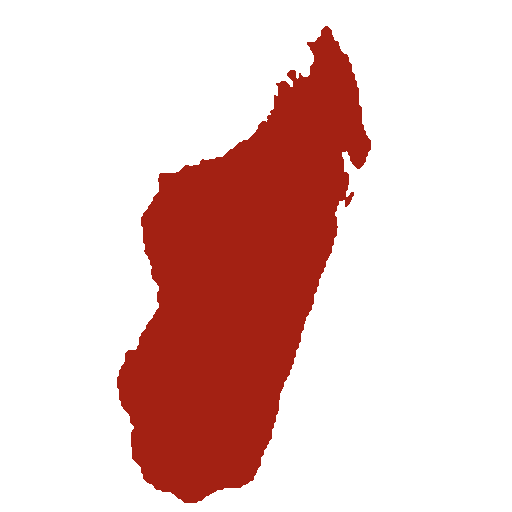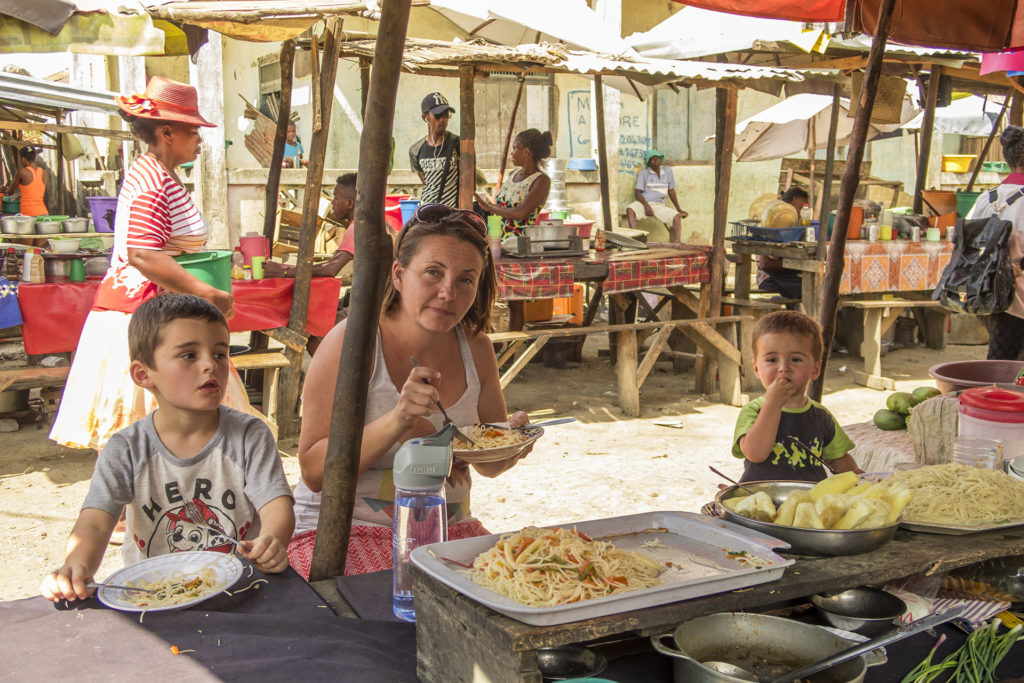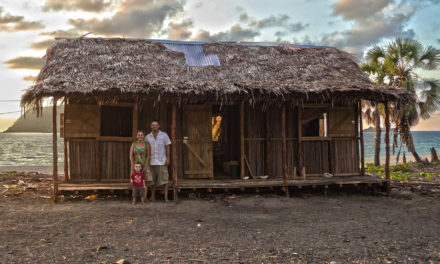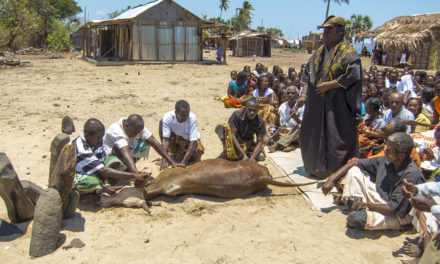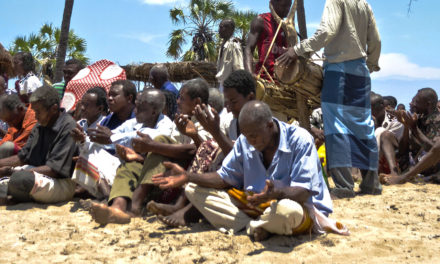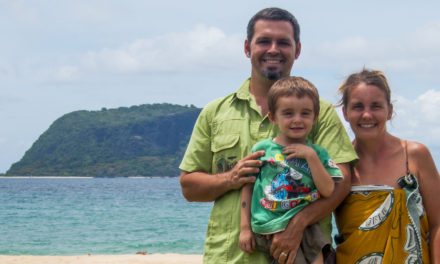I f you look at a globe, and you put your finger in the middle of the US, then turn the globe around to the exact opposite side, you’ll find yourself in the middle of the Indian Ocean. If you had to swim to land from there, Madagascar would be a good bet. Contrary to popular belief, if you tunnel straight through the world from the US, you won’t end up in China – instead you’ll be in the Indian Ocean somewhere far off the coast of Madagascar.
Where we are now is about as close as we can come to being on the exact opposite side of the world from where we were just a month ago. These polar opposite points are known as “antipodes”. Maybe as a kid you remember seeing those classic illustrations of the planet, with people in the US standing upright, and people on the other side of the world standing upside down. Sometimes that’s what it can feel like, going from one side of the planet to the other – like we’re standing upside down. Everything’s different, like it’s all been flipped head-over-heels. But we’ve flipped upside-down too, along with everything else. We’re already used to this way of life and now it seems normal; from our new perspective here, everything looks right-side-up. But when we think about it and we try in our minds to see this side of the world at the same time as the other side – that’s when things just don’t line up, it’s like we have double-vision: half of the world is upside-down and the other half is right-side-up. But which is which?
We have one way of living in Africa, in Madagascar, on Nosy Mitsio, and a totally different way of living in the US. Our two ways of living don’t really even seem to meet in the middle anywhere. It’s like having two strong magnets where you try to push two of the same sides together and there’s this invisible force that keeps them always separate, no matter how much effort you put into trying to keep them together. It’s like our two sets of lives can never meet up.
I recently read a book about a man who loses literally all of his memory about everything, and at the same time he wakes up in a totally different place than he came from. He starts off again like a baby and spends four or five years learning everything new and as for the first time: learning to survive (a new place), learning to speak again (a new language), learning to interact in community (a new culture). His new self is entirely different from his old self that he lost, of which he has no memory, and he doesn’t even know any details about his former life. But towards the end of the book, his old self and his old memories come rushing back all at once. It’s a time of intense disorientation for him, as he’s essentially living the lives of two different people, with two ways of viewing the world, two sets of experiences, two entirely different languages in which to think, but all in a single body in a single place. It’s like he has double vision, but worse, double of every sensation, as he has essentially two minds with which to process everything.
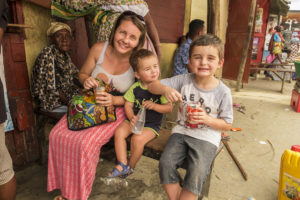
It’s good to be back in Ambilobe! It’s the town on mainland Madagascar where we do our supply shopping. We have a favorite roadside vendor who sells yogurt, milk, and breads for breakfast.
For us, coming so recently from an extended time in the US to here on the other side of the world – from one place where we’re well-adapted, back here to another place where we’re well-adapted, but both places and both ways of living and interacting so entirely different – for us it can feel much the same as the man in this book living his double lives. If we try to see from both perspectives at once, it gets confusing, like having double vision. If we can rely on just one perspective at a time, looking at Madagascar through our Madagascar lenses we’ve developed, through the Malagasy languages, then everything comes into focus and makes sense. It’s the same as being in the US: if we look at the US through our US lenses, through the experience of our US lives, then it all more or less makes sense and we can be comfortable with it. But when we try to look at one through the lens of the other (or worse, with both lenses at the same time), that’s when it all gets disorienting and hard to find a focal point.
In this time of transition, coming so recently from the US to this opposite point on the globe, it’s hard to remember each day which lenses to put on, or even which ones to take off. It’s at these times that we’re most aware of the “double lives” we’re living. And it’s these transitional times that I think are often the most difficult. Once we’ve been here for months and years it’s easy to focus on Madagascar through our Madagascar lenses . At that point, simply living here and relating to people here doesn’t seem difficult at all. And I don’t even think very often of life back in the US; instead I can see clearly what’s around us and focus on the work and the vision for why we’re here. But around the months of leaving and coming, that’s when our vision gets muddled.
L eaving the US this time was particularly difficult. Maybe because we’d had such a long stretch there and readjusted well to American life. Or maybe it’s the current age of our kids. But seeing how much joy our kids brought to our parents (their grandparents), and vice-versa… that’s hard to say “bye” to when you know you’re taking them away from each other for another few years at a time. And when you look towards the future and know that it’ll most likely always be like that – only seeing each other for months at a time with stretches of years in-between, all those important moments missed out on… That’s hard to swallow. Those goodbyes feel like a betrayal; it feels like we’re being dishonest when we say “goodbye”, full of love, and then we turn around and willingly take our kids away from them again for several more years. That’s part of what it can mean to look at Madagascar through a US lens. That’s a consequence of us living our double lives.
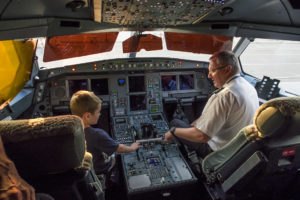
Matimu was even more fascinated with airplanes on our trip back to Madagascar, even more than he was on our trip to the US. He made sure that every plane we boarded (5 of them), he asked if he could see into the cockpit. The biggest plane (Washington, DC to Johannesburg, South Africa) even let him sit up in the pilot’s seat and get a personal lesson from the pilot! While we were on the ground thankfully.
Of course there are times where we think about the comforts and conveniences of the US, because man, those are nice! Or the easy access to wide Christian fellowship for anyone who seeks it. It’s refreshing! Obviously we don’t have those things here in Madagascar and if we think about it too much from our US standards, then it makes living here hard.
But even while we’re in the US, there are times it’s difficult for us to see the isolation of the individual, the way a single person’s desires for themselves are seen as ultimately important. And we see how that limits the ability for people to care for each other, how it often even limits the American church from developing into an intimate and accountable community working together for a common purpose (rather than for individual’s varying purposes). And that troubles us. But that’s part of what it can mean to look at the US through a Madagascar lens.
When it all comes down to it, comforts and conveniences aren’t that big of a deal. When we look at Madagascar through Madagascar lenses, the lifestyle can be enjoyable and satisfying, and the risks we take to live here can be moderated.
But I haven’t yet figured out how to look at our American relationships through any lens that really satisfies. It’s sad spending years away from our closest friends, and we have so many good friends. Though I think it does make our short times together a celebratory occasion, and that’s always really nice. But seeing my parents as they said goodbye to our kids before we left… there’s no way to make up for that. What new perspective can actually make that easy?
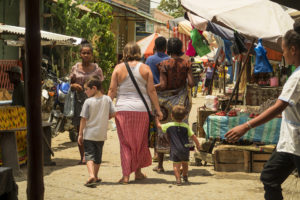
This is the first time for David to be walking around the market, the first time we have two kids to keep track of when walking around! Everyone loves to see how much he’s grown though.
I know that in a few months we’ll be fully back into the swing of things and we won’t be thinking of the US that often. Honestly, it’s pretty much already happening – we’ve just kind of jumped right back into the lifestyle here and it all feels natural again. But definitely within a few months, we’ll have our full focus here, everything will seem to be in a clear perspective, with a vision for the future, and that helps quite a lot. But when we do think of the US, and we think of the people there, and our relationships that we’re absent from – particularly between our children and their grandparents – well, what can we say about it? It’s hard. It’s part of what it means to be living our double lives.
S o with all these thoughts, and the sometimes double-vision which accompanies them, I can only really think of these lines from Jesus:
To follow Jesus doesn’t mean we won’t lose what we have. He makes it very clear that, for his sake, we might indeed lose everything, including that which is most meaningful to us – the people we love. His promise of us receiving “many times as much” is a bit perplexing because who could really replace the people we love? I don’t want any new siblings, new parents, new children, or new spouse. But I think the focus must be in those last few words: “and in the age to come eternal life.”
All of our lives, and even our closest relationships, are indeed temporary. They will pass. But there is an age to come, an eternal one. And what we invest now, even sacrificing everything for God’s Kingdom, will be caught up in his eternal promises, in that age to come in which everything given has been enriched, everything sacrificed will be multiplied, and everything sown harvested.
Recently speaking with a colleague, talking about the work in Madagascar, he said that he believed one day we would be the grandparents and great-grandparents of many generations of Antakarana believers, standing there together with Jesus at his throne, welcoming them together into his Kingdom. I would love for that to be true. But even if it turns out that’s not our part in this work God has called us to, I do know that everything he does is eternal. He’s asked us to join him in this work to reach them and we know that it will be eternally significant.
So it’s not an American perspective that we need to take, nor a Malagasy perspective – though both can be helpful each in their proper situations. But it’s an eternal perspective that we need from God, that we need when we view the things around us, and that we need when we consider our position in life. We need his eternal perspective in regards to the sacrifices we can’t avoid when following Jesus where he leads us. With an eternal perspective, our double vision isn’t cloudy or confused, but it’s clear and focused, seeing things that aren’t yet, but which we know will be. Our double lives become merged into really just one: life in Christ.
In Christ,
Adam, Lora, Matimu, and David Willard
P.S. So, we’re finally back in Madagascar! We get to Nosy Mitsio on Tuesday! Please be praying that the weather and travel is good, that we re-settle quickly, and that God guides us well as a team in the best ways to reach the people with his good news. Visit our prayer request page for more prayer requests.
Also, we’ve updated our contact information on our contact us page. There you can also find some info on sending mail or care packages to us here in Madagascar if you’d like to do that. We always appreciate hearing from you and we thank you all for your prayers and support!
